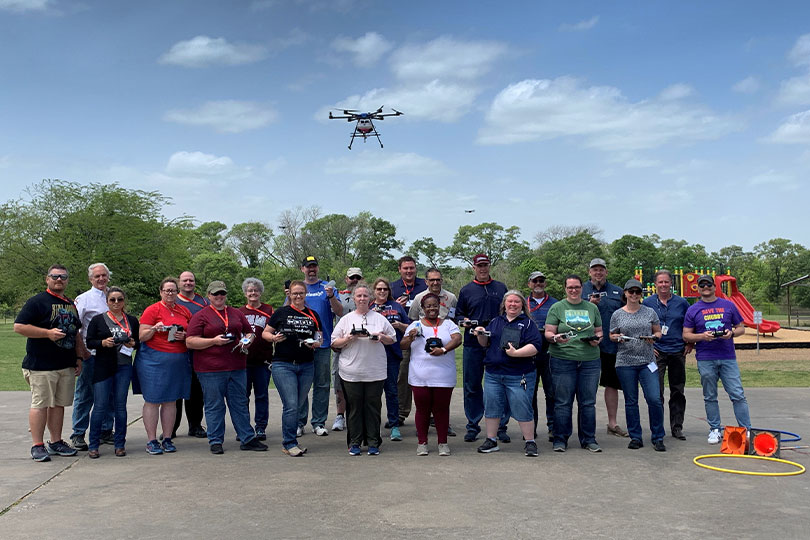By Julie Tomascik
Editor
Texas high school science teachers learned about the science behind drone technology and its role in agriculture through a new workshop.
The Fields of the Future: The Science of Drones in Agriculture workshop was hosted by Texas Farm Bureau (TFB) and the National Ag in the Classroom Organization (NAITCO) in partnership with the Agricultural Research Service of the U.S. Department of Agriculture (USDA) April 9-10 in Bryan.
“The goal of the workshop was to give high school science educators the opportunity to work with drone experts and other scientists who are using the technology and other unique methods to learn more about agriculture,” said Jordan Bartels, TFB associate director of Organization, Educational Outreach. “Farm Bureau, NAITCO and partners at USDA wanted to provide an experience and information that will aid teachers as they work to incorporate agriculture in their classrooms.”
Twenty teachers attended the hands-on workshop, and each received a free MAVIC-MINI II drone and lesson resources.
Participants learned how to fly the drone and how it is used to help farmers from an agricultural engineer in USDA’s Aerial Application Technology Research Unit.
They also learned how drones are used in research projects and problem-based learning. This session was led by a science teacher who uses drones with his students to study the watershed around the school, looking to pinpoint pollution sources and to suggest possible solutions.
“During the workshop, teachers learned, among other things, how drones are currently used in agriculture to observe crops, livestock and land,” Bartels said. “The drones they received are capable of taking pictures that can be used to observe plants and more.”
Since the workshop, teachers have posted pictures of their students using the drones on Earth Day to make species observations and look for pollution sources around the school campuses.
Others, like Laurie Heron-Beaulieu who teaches at Magnolia High School, are using the lessons and concepts learned to grow an awareness of agriculture.
“I learned something from every presenter. Everything they taught, I can use in my physics classroom,” Heron-Beaulieu said. “I’ve been to a lot of workshops, but this was one of the few that I can say is adaptable to any area and is something I can use right away.”
There are about 2,000 students in Magnolia High School, and Heron-Beaulieu believes what she learned at the workshop can be applied to classroom activities for any of those students.
“I can use what I learned at the workshop for my AP Physics kids and for our students who have special needs,” she said. “Many of my students want to be engineers, but they don’t know what kind of engineer. I’m trying to get them to branch out from petroleum engineer to an agricultural engineer, and some of the information I learned can help do that. There’s a wide diversity of positions out there in agriculture that many of them could be a good fit for.”
TFB believes in bringing agriculture to life in classrooms across the state to increase agricultural literacy and awareness in students in all grades.
“Simply put, agriculture is science,” Bartels said. “Everything in agriculture is ultimately based on scientific concepts and research, so it is imperative that we help students make those connections as they explore the world around them in and out of school.”
This project was supported by a grant from the USDA National Institute of Food and Agriculture, AFRI Professional Development for the Agricultural Literacy Priority Area.
For more information about TFB educational opportunities and other Ag in the Classroom activities and resources, visit texasfarmbureau.org/aitc.

